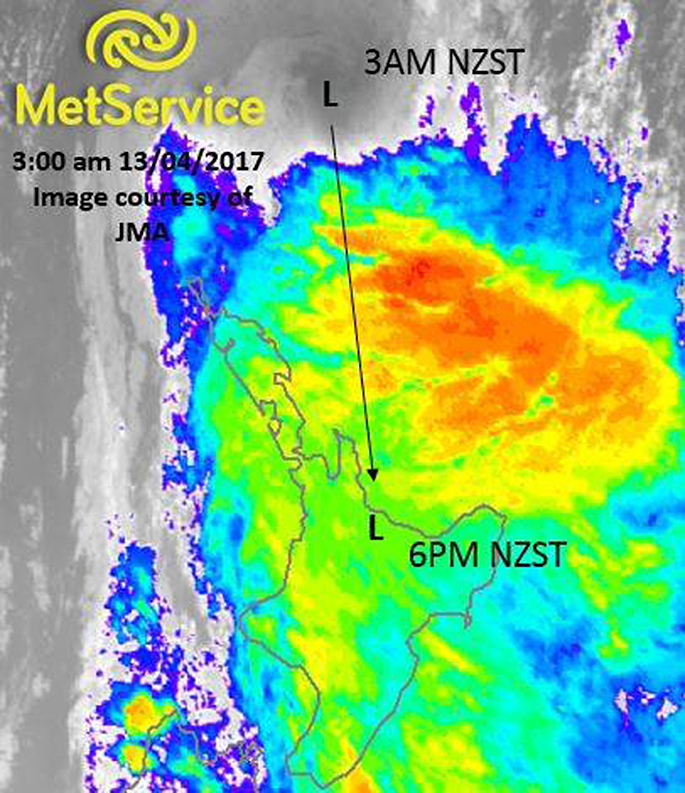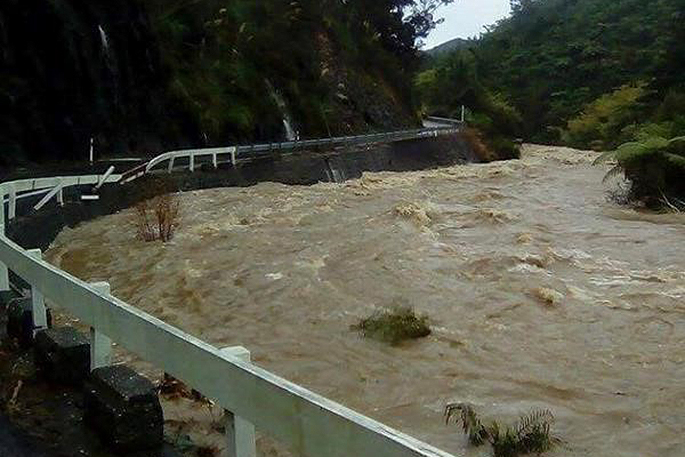Bursts of heavy rain are expected to continue throughout today as Cyclone Cook approaches and is projected to make landfall over the Coromandel and the Bay of Plenty this afternoon.
Ex-TC Cook is centred about 180nm northeast of North Cape, and moving south at 18 knots.
'Don't let the lack of convection (orange and red hues) fool you - very strong winds still surround the centre of the system, with further strengthening anticipated this morning and afternoon,” says the latest update from the MetService.
'Cook is expected to approach Coromandel Peninsula during the afternoon, then moving onshore near western Bay of Plenty early this evening.”

At least 150-250mm of rain during this weather event is expected until midnight tonight with some pretty gnarly winds, damaging severe gales with gusts of 150 km/h or more are possible, and potential thunderstorms.
MetService are also saying it's meant to be the worst storm since 1968, which was the one that caused the Wahine Disaster, according to a statement from the Thames Coromandel District Council.
'People should be aware that this is a very significant event and is likely to produce widespread flooding, slips and wind damage, including to powerlines and may even lift roofs and bring down large trees.
'Driving conditions are likely to be hazardous, so people will need to take extra care on the roads, and even consider altering their Easter travel plans.”
To check for outages and report faults see www.powerco.co.nz/power-cuts.
High tide is around 8:30am, and 'we're expecting big waves, maybe 5 metres, especially on our east coast, which could cause coastal inundation, especially in low-lying areas near rivers and streams that are flood-prone at high tides when there is heavy rain”, says the TCDC.
'We are seriously advising people to avoid visiting the Coromandel until at least Saturday and if people do decide to make the journey they must be prepared to be turned back, be isolated and have their journeys severely disrupted.”
Please check your emergency supplies, keep your phone on the charger and stay up to date with messages from us, Civil Defence, MetService and NZTA.
Thames Valley Civil Defence has welfare teams on standby in Whitianga, Whangamata, Tairua, Pauanui, Coromandel and Thames, should they be needed.
School Closures:
The Ministry of Education states that all schools and early learning centres in the Coromandel will be closed tomorrow.
Roads Closures:
- SH25 - Thames Coast Road – (Thames to Coromandel) has been closed again at Ruamahunga Bay due to a major slip until further notice due to the slip there. NZTA ask you to avoid this area or delay your journey if possible.
- SH25, which is the Thames Coast Rd, is closed between Waiomu and Preece Point because of several large and small slips. Contractors will be doing full patrol at first light to re-assess. There is likely to be debris and water on other sections of this state highway, so we recommend not travelling and checking further updates on NZTA website.
'We have no local roads currently reported closed, however members of the public who have been travelling on our roads advise us that there are just a few minor slips and a bit of surface flooding at this stage.
'We still have road works and traffic management across the Coromandel from last week's downpour so again, please avoid travel if possible, expect delays and drive with caution.”
River Levels:
All river levels are rising, to check current levels see the Waikato Regional Councl website www.waikatoregion.govt.nz/services/regional-services/river-levels-and-rainfall
Be prepared
Civil Defence would like to remind everyone to be prepared to potentially be isolated, without power, and you may need to make alternative arrangements if you are planning on travelling.
Now is also a good time to check your emergency survival kits and getaway kits.
- Have plenty of food and water for at least three days.
- Battery powered lighting is the safest and easiest and you should check all batteries every three months. Do not use candles as they can tip over in earthquake aftershocks or in a gust of wind. Do not use kerosene lamps, which require a great deal of ventilation and are not designed for indoor use.
- First aid kit and essential medicines.
- Blankets or sleeping bags.
- Pet supplies.
- If possible, make sure your mobile phones are charged.
Click here for a full checklist.
We also remind you that you may need to take care of yourself at home for up to a week, so check out everything you need at www.happens.nz.
*SunLive will provide an update on the school closures in the Western Bay of Plenty in another story to be posted soon.



0 comments
Leave a Comment
You must be logged in to make a comment.